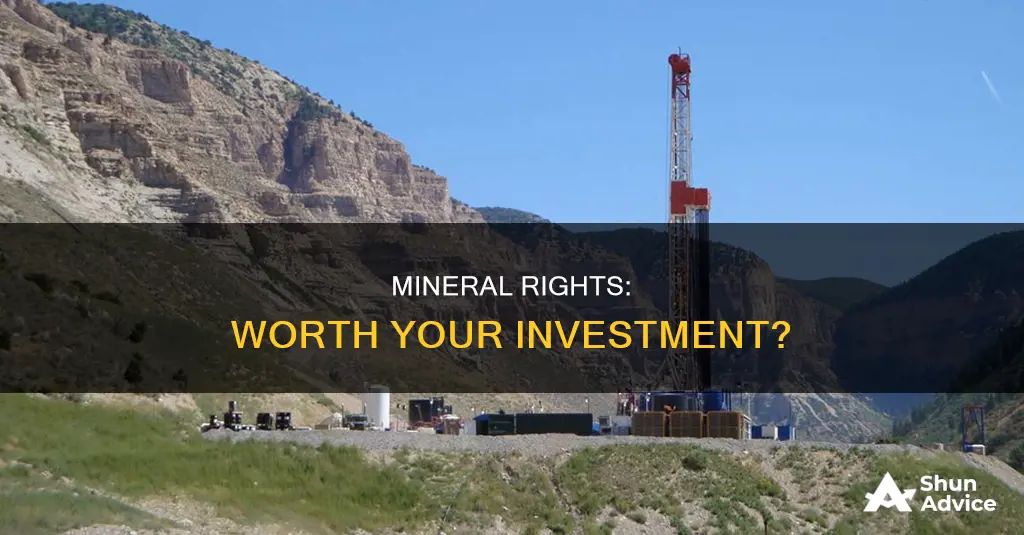
Investing in mineral rights can be a great way to generate passive income and diversify your portfolio. Mineral rights refer to the ownership of underground resources like metals, fossil fuels, and mineable rocks. In the US, mineral rights can be privately owned, which means that individuals with valuable resources on their property can sell those rights to private companies, often receiving ongoing royalty payments or substantial upfront payments. Mineral rights owners are also entitled to explore, develop, and extract the minerals on their land.
There are several benefits to investing in mineral rights. Firstly, mineral rights ownership provides a source of passive income through royalty payments. Secondly, it can serve as a long-term investment as minerals are non-renewable resources with long-term potential for value growth. Thirdly, mineral rights can help to diversify an investment portfolio and provide a hedge against inflation. Additionally, mineral owners do not incur any drilling liability or expenses, and there are also tax benefits associated with mineral rights ownership.
However, it is important to note that investing in mineral rights also carries certain risks. For example, the value of mineral rights is heavily dependent on the price of commodities like oil, and there may be environmental or legal risks associated with extraction activities. Therefore, extensive due diligence is necessary before investing in mineral rights to ensure a thorough understanding of the potential risks and rewards.
What You'll Learn

Mineral rights ownership
In the US, mineral rights are distinct from surface rights, and the two can be severed, meaning they can be owned by different entities. This separation is common in states such as Texas, Oklahoma, Pennsylvania, Louisiana, Colorado, and New Mexico.
There are four main types of mineral rights:
- Surface Rights: Ownership of the minerals on the surface only.
- Mineral Interests: Ownership of mineral rights under the ground, which can include royalty, lease, and shut-in payments.
- Royalty Rights: The owner earns a stream of royalty payments as an investor in mineral rights.
- Oil and Gas Rights: As oil and gas are fluid, they can spread to neighbouring tracts of land, and this right is known as the "rule of capture".
Mineral rights can be transferred by deed, will, or lease, and there are various types of ownership structures, including unified estate, severed or split estate, royalties, mineral leases, licenses, and easements.
When buying or selling mineral rights, it is crucial to conduct thorough due diligence to avoid common pitfalls and ensure a successful transaction.
Elon Musk's Current Investment Focus
You may want to see also

Tax benefits
Investing in mineral rights can be a great way to generate passive income and diversify your investment portfolio. Mineral rights refer to the ownership of underground resources like metals and fossil fuels, and they come with several benefits and perks. One of the advantages of owning mineral rights is the tax benefits that come along with it.
Mineral rights are considered an investment in "real" property, and there are tax benefits associated with this type of investment. In the United States, mineral rights owners can benefit from IRS tax code 1031, which allows them to defer tax on capital gains from the sale of their royalty, mineral rights, or property. This means that if you sell your mineral rights, you can reinvest the proceeds into another qualifying property and defer paying taxes on the capital gains. This can be a great way to reduce your tax liabilities and protect your capital.
Additionally, mineral rights owners may also be able to take advantage of certain tax deductions and credits. For example, if you are generating income from your mineral rights, you may be able to deduct certain expenses related to the extraction or development of the minerals. It's important to consult with a tax professional to understand the specific tax implications and benefits of owning mineral rights.
Furthermore, when it comes to selling mineral rights, there are a few important tax considerations. The tax implications of selling mineral rights can be complicated, and it's important to understand the difference between selling mineral rights and collecting royalty income. The taxes on mineral rights royalties are usually treated as ordinary income, which means you pay both state and federal taxes on the royalties you receive. On the other hand, if you sell your mineral rights, you may be able to take advantage of capital gains tax rates, which are typically lower than ordinary income tax rates.
In conclusion, investing in mineral rights can provide several tax benefits that can help reduce your tax liabilities and protect your capital. However, it's important to consult with a qualified tax professional to understand the specific tax implications for your situation.
Boston Dynamics: The Future of Robotics
You may want to see also

Risks of investing in mineral rights
While investing in mineral rights can be a great source of passive income, there are several risks associated with it. These risks can be categorised into three types: purchasing, ownership, and selling.
Risks Associated with Purchasing Mineral Rights
Purchasing mineral rights can be risky if you don't have extensive knowledge of the oil and gas industry. Most people inherit their mineral rights, but mineral owners assume a lot more risk than they realise. Some of the risks associated with purchasing mineral rights include:
- Interest in a new well: New oil and gas wells decline sharply, and using the royalties from the first few months of production to value the property can result in overpaying for the interest.
- Buying interest in an old well: Buying interest in a well that is near the end of its life is risky as it may be abandoned before you see a return on your investment.
- Buying non-producing minerals: The biggest risk is that a successful well is never drilled, or it turns out to be a dry hole or a marginally successful well.
- Poor due diligence: It is the buyer's responsibility to conduct extensive due diligence before purchasing minerals. Poor due diligence may result in purchasing minerals from someone who doesn't actually own any or who owns only a small fraction of what they claim.
- Poor lease terms: Most mineral owners do not hire an attorney to negotiate lease terms, which can result in unfavourable terms that benefit the operator at the expense of the mineral owner.
Risks Associated with Owning Mineral Rights
Mineral ownership comes with its own set of risks, even if the minerals were inherited rather than purchased. Oil and gas are considered some of the riskiest investments available, and the risks associated with owning mineral rights include:
- Declining oil and gas reserves: Royalties often drop to a third or less of their initial production and eventually stop altogether.
- Steep decline curves: Conventional wells can produce small quantities of oil and gas for decades, while long horizontal wells produce large quantities but only for a short time.
- Held by production (HBP): Operators try to keep an oil well producing even if it's barely profitable, which can prevent another operator from drilling a well on your tract of land.
- Lack of infrastructure: New shale plays, such as the Permian Basin, are struggling with infrastructure constraints, leading to shut-in wells or operators flaring gas without paying royalties.
- Low commodity prices: Excessive drilling and geopolitical situations can lower oil and gas prices, resulting in lower royalty checks. When prices drop too low, wells become uneconomical to operate and are plugged, releasing the lease.
- Unfavourable political climate: The push towards renewable energy due to concerns about climate change can negatively impact the value of mineral rights.
- Overriding royalty interest (ORRI): ORRIs end when the lease ends, so if the wells are plugged, you no longer own the mineral rights.
- Incorrect division orders: Mineral owners must sign division orders to receive royalty payments, but signing an incorrect order can lead to underpayment.
- Poor mineral management: Managing minerals can be time-consuming and labour-intensive, especially if you own a lot of interests. Mismanaging your minerals can lead to reduced royalty payments, missing royalties, and ownership returning to the surface owner.
- Trouble proving heirship: To transfer mineral ownership, certain documents must be filed, and if these cannot be located, you may miss out on royalties.
- Dormant minerals act: Many states have enacted a dormant mineral act, which requires mineral owners to register their minerals every few years or risk ownership reverting to the surface owner.
Risks Associated with Selling Mineral Rights
Selling mineral rights can eliminate the risks associated with owning minerals, but it also introduces new risks. Some of these risks include:
- Missing future revenue: When you sell your minerals, you lose the opportunity to pass them on to the next generation, and you may miss out on future revenue if the minerals continue to generate royalties.
- Selling under market value: Mineral valuation is subjective, and different companies use different formulas. It's important to get multiple quotes to ensure you're getting a fair price.
- Not having all the facts: The company making an offer may have information that you don't, such as a permitted well to be drilled in the near future, which could increase the value of your minerals.
Rich Investors: Why Startups?
You may want to see also

How to buy mineral rights
Mineral rights refer to the ownership of underground resources such as metals and fossil fuels. Mineral rights owners can extract these resources or receive payment for their extraction.
There are multiple ways to buy mineral rights, with the most common being at auction, from brokers, by negotiated sale, tax sales, and directly from mineral owners. Here is a step-by-step guide on how to buy mineral rights:
- Develop an acquisition plan: Decide on the type of mineral rights you want to buy and the location you prefer.
- Browse minerals for sale: Look through auctions, sealed bids, negotiated sales, and mineral listings to find what's available and fits your plan.
- Perform due diligence: Research the property on the state's oil and gas regulatory commission's website. View the production, lease terms, and verify ownership.
- Make an offer: If you find a listing that interests you, make an offer or place a bid.
- Transfer ownership: Once your offer is accepted, send the conveyance document or deed to the county clerk for recording. If you bought producing minerals, send a copy of the recorded document to the operator to transfer the minerals into your name.
- Manage your minerals: Keep good records of what you own, including original documents, digital copies, and a spreadsheet detailing your assets.
It is important to note that buying mineral rights is risky, especially when you are paying for them rather than inheriting them. Make sure to do your research and understand the oil and gas industry before making any purchases.
Is Now the Time to Invest?
You may want to see also

Benefits of mineral rights ownership
Mineral rights ownership can provide several benefits to investors. Here are some key advantages to consider:
Passive Income and Long-Term Value
Mineral rights owners can generate passive income by receiving royalty payments based on the production and sale of minerals extracted from their property. This income is typically a share of the value of the produced minerals, and it can be a steady source of revenue without incurring any drilling liabilities or expenses. Moreover, as mineral reserves become scarcer, the value of mineral rights tends to appreciate over time, providing long-term value for investors.
Diversification and Hedge Against Inflation
Investing in mineral rights offers an opportunity to diversify an investment portfolio. By adding mineral rights to their portfolio, investors can potentially reduce risks associated with other investment types, such as stocks or real estate. Minerals, especially oil and natural gas, tend to retain their value even during inflationary periods, making them a good hedge against inflation.
Flexibility in Leasing and Selling
Mineral rights owners have the option to lease their rights to mining companies for a specified period, earning royalties during that time. They also have the flexibility to sell their rights outright, allowing for liquidity and the potential to realize immediate profits. This flexibility provides investors with various strategies to maximize the value of their mineral rights holdings.
Ownership of Real Property and Tax Advantages
Investing in mineral rights grants ownership of a tangible and appreciating asset, often referred to as "real property." This type of ownership can provide a sense of security and stability for investors. Additionally, real estate investments often come with potential tax advantages, such as deductions and incentives, which can further enhance the financial benefits of mineral rights ownership.
Unique Investment Opportunities
Investing in mineral rights, particularly in the oil and gas industry, presents unique opportunities in a rapidly expanding sector. It allows for portfolio diversification and the potential for attractive returns on investment. With the increasing demand for energy and mineral-dependent industries, mineral rights ownership can be a lucrative and strategic investment option.
Vodafone Idea: Right Issue Investment Guide
You may want to see also
Frequently asked questions
Mineral rights are the ownership rights to underground resources such as fossil fuels (oil, natural gas, coal), metals and ores, and mineable rocks such as limestone and salt. In the United States, mineral rights are legally distinct from surface rights, which give the owner the right to use the surface of the land for residential, agricultural, commercial, and other purposes.
Mineral rights ownership can provide a steady source of recurring revenue and act as a hedge against inflation. Mineral rights owners receive royalty payments, lease bonuses, and substantial upfront payments. They also have no drilling liability and pay no expenses.
Investing in mineral rights can be risky, especially if you don't have a good understanding of the industry. There is also the possibility of environmental pollution and legal disputes, which can result in liabilities.
It is important to conduct extensive due diligence before investing in mineral rights, including researching the location and the company you are buying from, evaluating the mineral deposit, and understanding the legal framework governing mineral rights.







